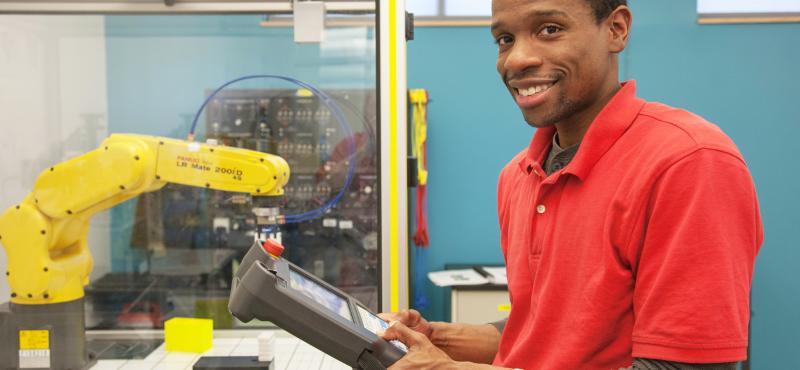Program Goals:
The CNC Technologies Certificate is designed to prepare graduates to enter the field of advanced manufacturing specifically as a Computer Numerical Control (CNC) operator/programmer. Students will gain an understanding of CAD/CAM systems and the conventions of blueprint reading, safety, metrology, quality, and machine operations. Using safe working practices, students will learn to operate, set up, and program Haas CNC equipment along with other production machines. Graduates will be able to apply sound mathematical principles to solve manufacturing problems.
Student Learning Outcomes:
Upon completion of the program, graduates will be able to:
- Apply mathematical and scientific concepts to solve manufacturing problems.
- Supervise and manage a variety of manufacturing systems.
- Practice safe working protocols to nurture ethical responsibilities.
- Communicate technical information both verbally and in written form.
- Use modern tooling, skills, and techniques for effective manufacturing systems practice.
- Apply accurate design methodology and use industry standard CAD/CAM software to improve quality and production.
- Identify problems before they occur and design a solution.
- Understand and manage product variability as defined by quality systems.
- Apply advanced methods of analysis, synthesis, and control of manufacturing systems.
- Safely operate, program, and set up a variety of CNC equipment.
- Measure manufacturing process variables and draw credible technical conclusions.
Admissions Process:
Admissions inquiries should be directed to admissions@qcc.mass.edu. Prospective students may apply to the program of their choice by following the enrollment steps at www.QCC.edu/enrollment-steps.
Program Admissions Requirements:
Students should note that some first semester courses carry minimum prerequisites. Refer to the program grid.
- High School Diploma or GED/HiSET.
- Must be able to lift 50lbs.
- Must have stable muscle control.
CORI, SORI, Finger Printing & Drug Testing:
Criminal Offender Record Information (CORI) and Sex Offender Registry Information (SORI) checks are not required. Fingerprinting and drug testing are not required.
Additional Cost:
See the Program Fees page.
- Lab fees will be charged for specific courses.
- Books and online LMS charges may apply to specific courses.
- Examination fees for third-party certification exams.
Technical Performance Standards:
See the Technical Performance Standards page. (Note: Not all programs have technical performance standards).
Credit for Prior Learning:
Credit for Prior Learning (CPL) allows students to use skills they already have towards a college degree or certificate. Work, life, volunteer and military experience may be translated into credit, allowing students to take fewer classes and earn their degree faster. CPL eliminates redundancies for students who have already earned credentials or mastered skills required for their program of study. Email experience@qcc.mass.edu for more information and eligibility.
- To evaluate technical prior learning credit, students should contact the Center for Career & Transfer Services.
Career Outlook:
Please consult the Massachusetts Career Information System at https://masscis.intocareers.org/ or the Occupational Outlook Handbook at www.bls.gov/ooh/ for specific occupational information. The CIP code for this program is 48.0510.
Transfer Articulations & Opportunities:
Prospective students may learn more about transfer articulation agreements at www.QCC.edu/agreements. More information regarding transfer opportunities is available at www.QCC.edu/transfer.
- The courses in this certificate can be transferred to the associate degree in Manufacturing Technology; upon graduation, they can be transferred to Fitchburg State University.
Additional Information:
- This certificate is designed for full-time enrollment.
- The courses in this program are aligned with national standards as set by the National Association of Manufacturers (NAM).
Certifications:



